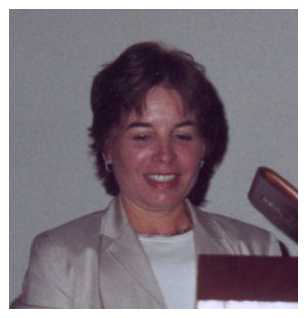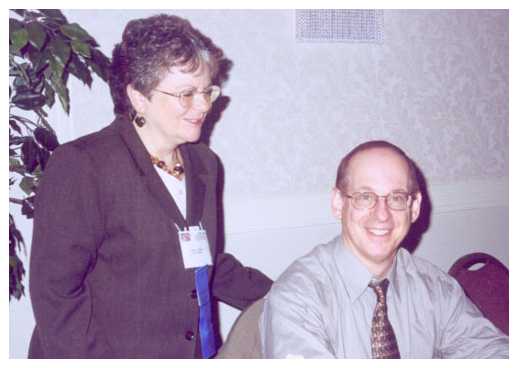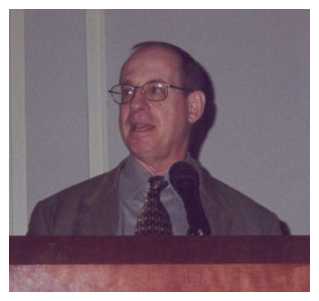
NJTESOL/NJBE Fetes Scholarship and Award Winners
Stephen Krashen Throws Down Gauntlet in Keynote
ESL MiniConference reported the NJTESOL/NJBE awards dinner
on the first night of a two-day spring conference in Somerset,
New Jersey. Here is our exclusive coverage of the lively
exchanges at this historic event. Photos by Robb Scott.
On May 16-17, 2002, the NJTESOL/NJBE held their annual spring
conference, "Coming Together Through Languages and Literacies."
One highlight of the two-day conference was Thursday evening's
First Annual Awards Dinner, held at the Double Tree Hotel and
Conference Center in Somerset, New Jersey.
The nearly 100 participants enjoyed a delicious three-course
dinner, including a choice of either broiled salmon with dill
herb sauce or sliced roasted NY sirloin with peppercorn sauce,
and chocolate raspberry mousse for dessert. The big treats,
however, were the honored guests.
NJTESOL/NJBE President Dr. Ana Mistral presented the annual leadership
award to David Nash, Assistant Director for Governmental Relations, of
the New Jersey Principals and Supervisors Association. David Nash,
a featured speaker whose Friday session would outline effective
strategies for advocating for the needs of English language learners
in today's policy-laden environment focused on educational
accountability, was praised for his leadership and advocacy.
The keynote speaker was Dr. Stephen Krashen, whose speech was titled
"What's New in Bilingual Education? Five Short Talks." He was introduced
by Judith O'Loughlin, an NJTESOL/NJBE past president and the organizer
of the awards dinner event. "He's a very strong advocate of bilingual education throughout the
United States," said Judy O'Loughlin. "He answers every letter to the editor and he writes articles
constantly. And he's been a very big friend to us at New Jersey TESOL/NJBE.
I'd like to introduce Dr. Stephen Krashen, Professor Emeritus at the University
of Southern California."
Dr. Krashen blasted the findings of the Bush administration's
National Reading Panel,
a committee composed of, in his words, "a chief executive officer of a
corporation, a physician, a physicist, about six educational psychologists...and
one legitimate educator, Joanne Yatvin, who wrote the minority report."
U.S. Public Schools Receive Their Marching Orders
The findings of the National Reading Panel are the basis of
a new Bush education law and also drive the funding priorities
of the federal government, said Dr. Krashen. "You cannot get
federal money for anything in education unless you show that
your work is consistent with the results of the National Reading
Panel," he explained, "and it is seriously flawed."
The panel has recommended activities to build "phonemic awareness,"
the ability to segment and blend phonemes, as a precursor to
learning to read, according to Dr. Krashen, who showed that
this recommendation--with broad implications for American
public education--was based on a single study done with 15 Israeli
children learning to read Hebrew as a first language. He reminded
the audience that Hebrew is phonetically regular, while English
is not. "This is nearly a hoax and a very dangerous one," said
Dr. Krashen. "A serious research hypothesis that has so many practical
implications, that's changed everyone's life, should be made of much,
much sterner stuff...The entire phonemic awareness movement is based
on the slimmest evidence." In his opinion, for English speakers
and English learners, "phonemic awareness is the result of reading,
not the cause of it."
Another major finding of the National Reading Panel is that
intensive phonics instruction is more valuable than a whole
language approach for developing English language skills. Dr.
Krashen said that, based on his analysis of the research studies
cited by the panel for this conclusion, if whole language is
defined as teaching which "includes a lot of reading," the
evidence really shows whole language is better. "Children in whole
language classes read better," said Dr. Krashen. "They like reading
more, they do more reading on their own and they do better on
tests of telling stories." In addition, on tests of pure phonics,
there is no difference between children in whole language and
those receiving phonics instruction. "So, there's nothing lost,"
he concluded.
Sustained Silent Reading Gets Short Shrift By Panel
Dr. Krashen was flabbergasted that the National Reading Panel
devoted 60 pages in its 600 page study to phonemic awareness,
60 more pages trying to demonstrate the superiority of phonics
over whole language and just six pages to sustained silent
reading, with the conclusion that "we are unable to determine
from the research whether reading silently to oneself helps you
learn to read." Does reading for pleasure help children learn
to read?, asked Dr. Krashen. "The federal government says it
doesn't know."
Dr. Krashen accused the National Reading Panel of not trying
hard enough to find research on the effects of sustained silent
reading (SSR). "They found 14 comparisons...I found 54, working just
a little harder. In 51 cases out of 54, the children in sustained
silent reading classes read at least as well or better. And when
you look at long-term studies, the children in sustained silent
reading studies never were worse, eight out of ten times read better."
Why Does the National Reading Panel Matter?
The reason this point is so important, explained Dr. Krashen, is
that the National Reading Panel findings are diverting federal
money into phonics and phonemic awareness instruction and away
from school libraries, which could offer more books for students
to read for pleasure, or "recreational reading."
One of Dr. Krashen's doctoral students at USC, Jeff McQuillan, has
looked at another test that was used in California from 1984 to 1990,
the CAP test. According to his data, the scores over that period of
time, stretching from before whole language was recommended by a
committee (including Dr. Krashen) in 1987 to several years later,
did not change. "We had nothing to do with test scores rising or
falling," said Dr. Krashen. "They were low well before."
School librarians are crucial to the development of reading
skills, too, according to research by Keith Curry Lance, cited
by Dr. Krashen, who pointed out that California lags far behind
the U.S. average of 900 students to each school librarian. "In
California, when our 'literacy crisis' hit [in 1990]," he explained,
"we had one for 5,000, by far the lowest...now it's one for every
5,300. California spends exactly half of what other states spend
on school libraries."
Public libraries in California also underserve the children of
the state, said Dr. Krashen, who noted that library budgets have
been slashed 30 percent since 1987, with children's services hit
the hardest. In addition, according to data from McQuillan's research,
California ranks in the bottom ten of the country, on a poverty scale,
in terms of homes in which there are fewer than 25 books. "Our children
in California are children in poverty," said Dr. Krashen, "where
poverty among other things means fewer books."
The Pressure To Validate Political Rhetoric
One clear underlying message in Dr. Krashen's sincere call to arms was
that America's young people are ill-served by politically driven rhetoric
coupled with tighter education budgets and ever increasing pressures
to perform on the latest standardized test. And he quoted his doctoral student,
Jeff McQuillan, as praising the only saving grace in the lives of California's
students: their teachers. During the past 20 years, McQuillan says,
access to books has been low and is constantly getting worse, yet
test scores have stayed the same. "That means California's teachers
are doing a good job, doing the best they can under very difficult
circumstances."
The fifth of Dr. Krashen's five mini-talks dealt with what he called
the other "urban legend" which everyone believes is true, that test
scores skyrocketed in California after Proposition 227, the Ron Unz
initiative to abolish bilingual education. The test in this case is
the SAT9, which was introduced in 1998, the year Prop 227 passed. Any
rises in test scores in subsequent years, according to Dr. Krashen,
are the combined results of natural test score inflation, bogus
efforts to increase test scores and, in the unique case of the famous
Oceanside district, bizarre forms of bilingual education used prior
to passage of 227.
The Danger Ron Unz Poses for New Jersey's Educators
It is important for bilingual educators to really understand what
has happened in California, warned Dr. Krashen. "The future of this
group, of bilingual education in New Jersey rides on having
an answer to this argument," he said, "because Unz is doing very well on his
promise to eliminate bilingual education in every state...This is
Armageddon."
There are two key aspects of California's Prop 227 experience which
the mainstream media has not focused on when reporting the results
of this intiative to abolish bilingual education, according to Dr.
Krashen. One is that scores on the new SAT9 test went up everywhere
in the state, even in districts which hadn't had bilingual programs
before 1998 and even in the districts which received waivers to continue
using bilingual education.
Oceanside's Spectacular Trajectory Or ...
The second important feature of California's landscape since 1998 has
been the national prominence of the Oceanside school district, where
SAT9 scores literally did skyrocket following conversion to a no-Spanish,
all English immersion approach. Dr. Krashen cited an article in the
Washington Post where Oceanside's superintendent Ken Noonan described
the kind of bilingual program which existed there before Prop 227.
According to Dr. Krashen, Noonan reported that the bilingual program
at Oceanside had delayed English for four to five years. "This isn't
a bilingual program," said Dr. Krashen. "This is a monolingual Spanish
program."
"What we do in bilingual education is we use the first language
in a way that facilitates and accelerates second language development,"
continued Dr. Krashen. "We are committed to English language development
and the good bilingual models that we all agree with are ones that
introduce ESL right from the very first day." The reason Oceanside
had such low scores on the SAT9 the first year, and such higher scores
the following, had more to do with the poor quality of their approach
to bilingual education than with the elimination of bilingual education,
according to Dr. Krashen.
Eyes on the Prize
Oceanside also represents the worst excesses of the test-prep mania
which drives school districts in California to compete for cash
prizes from the state department of education, according to Dr.
Krashen, and to fear elimination if students' test scores don't
improve. "Since 227, there has been a phenomenal emphasis on test
preparation in the Oceanside district," he said. "Teacher professional
days have been reduced--in some cases, eliminated. More focus on English
and mathematics, because that's what's tested. We see this all over,
where things have been cut back, cut back, to have more test prep."
A stark picture of the California school system was painted in
painstaking detail by Steve Krashen in his keynote to New Jersey teachers
last Thursday. By his account it is a system where elected officials
are pressuring administrators to prove--on the backs of the children--that
free reading, whole language and bilingual education were wrong. Where
the growth of Ron Unz's nationwide anti-bilingual and any other
anti-anything movement is spurred on by every point of improvement on the test
that can be squeezed out of California's students, by hook or crook. All this
pressure to push scores up by any means is, in Dr. Krashen's words,
"like claiming you raised the temperature in the room when all you
did was put a match under the thermometer."
Reference links:
By Robb Scott
2002 ESL MiniConference Online
 NJTESOL and NJBE scholarships of $1000 were awarded to four
students who had learned English as a second language, excelled
academically and are now embarking on the next stages of their
American education at the college and university level. Each
scholarship winner spoke in English and in their first languages,
expressing their gratitude and determination to continue learning.
Family members were also present to witness the event.
NJTESOL and NJBE scholarships of $1000 were awarded to four
students who had learned English as a second language, excelled
academically and are now embarking on the next stages of their
American education at the college and university level. Each
scholarship winner spoke in English and in their first languages,
expressing their gratitude and determination to continue learning.
Family members were also present to witness the event.
 The NJTESOL/NJBE Presidential Award went to Dr. Mihri Napoliello,
a past president of NJTESOL/NJBE, for her contributions in the
field of teacher training. Dr. Napoliello was overwhelmed when she
arrived at the dinner to find her parents, Mr. and Mrs. De los Reyes,
who were born in Cuba, her husband, Ralph, their two children and her sister--currently
studying to be an ESL teacher--waiting for her at a table of honor.
The NJTESOL/NJBE Presidential Award went to Dr. Mihri Napoliello,
a past president of NJTESOL/NJBE, for her contributions in the
field of teacher training. Dr. Napoliello was overwhelmed when she
arrived at the dinner to find her parents, Mr. and Mrs. De los Reyes,
who were born in Cuba, her husband, Ralph, their two children and her sister--currently
studying to be an ESL teacher--waiting for her at a table of honor.
 Dr. Krashen spoke on five key issues on which public opinion and federal
policy today run counter to the interests of educators who believe whole language,
recreational reading and bilingual education are good for learners of English
as a second language.
Dr. Krashen spoke on five key issues on which public opinion and federal
policy today run counter to the interests of educators who believe whole language,
recreational reading and bilingual education are good for learners of English
as a second language.
 Not only is federal education policy wrongheaded, in Dr. Krashen's
view, but public opinion in America has been hijacked by what
he refers to as two "urban legends" which influence education
decisions at local and state levels. The first urban legend,
according to Dr. Krashen, is that when California introduced whole
language in 1987, test scores plummeted. This legend has grown
out of a 1992 National Assessment of Educational Progress (NAEP)
test on which California's fourth-graders ranked last in the country,
explained Dr. Krashen. "But was there a drop?," he asked. "This is
a scandal ten times as outrageous as Watergate. They never looked."
According to Dr. Krashen, 1992 was the first time the NAEP scores
were analyzed by states, so there was no pre-test. "They assumed
that things must have been much better in California before, but
they never looked."
Not only is federal education policy wrongheaded, in Dr. Krashen's
view, but public opinion in America has been hijacked by what
he refers to as two "urban legends" which influence education
decisions at local and state levels. The first urban legend,
according to Dr. Krashen, is that when California introduced whole
language in 1987, test scores plummeted. This legend has grown
out of a 1992 National Assessment of Educational Progress (NAEP)
test on which California's fourth-graders ranked last in the country,
explained Dr. Krashen. "But was there a drop?," he asked. "This is
a scandal ten times as outrageous as Watergate. They never looked."
According to Dr. Krashen, 1992 was the first time the NAEP scores
were analyzed by states, so there was no pre-test. "They assumed
that things must have been much better in California before, but
they never looked."
 McQuillan's research strongly suggests that the reasons for
California's entrenched low ranking on tests of educational
achievement are related to the extremely limited access to
reading material for children there. Dr. Krashen cited some
of McQuillan's findings. "In the United States, the average
elementary school library has 18 books per child," said Dr.
Krashen. "In 1990, we were dead last in the country with 13 books
per child...Today, thanks to our two education governors, it is
now 11 books per child. Los Angeles Unified? Six books per child."
McQuillan's research strongly suggests that the reasons for
California's entrenched low ranking on tests of educational
achievement are related to the extremely limited access to
reading material for children there. Dr. Krashen cited some
of McQuillan's findings. "In the United States, the average
elementary school library has 18 books per child," said Dr.
Krashen. "In 1990, we were dead last in the country with 13 books
per child...Today, thanks to our two education governors, it is
now 11 books per child. Los Angeles Unified? Six books per child."
Article about the National Reading Panel, by Elaine Garan, in Phi Delta Kappan
Search Education Week archives for Krashen letter about National Reading Panel
Home Page of Kenji Hakuta, of Stanford, who studied SAT9 Results
San Fran Chronicle story about pressure to raise test scores